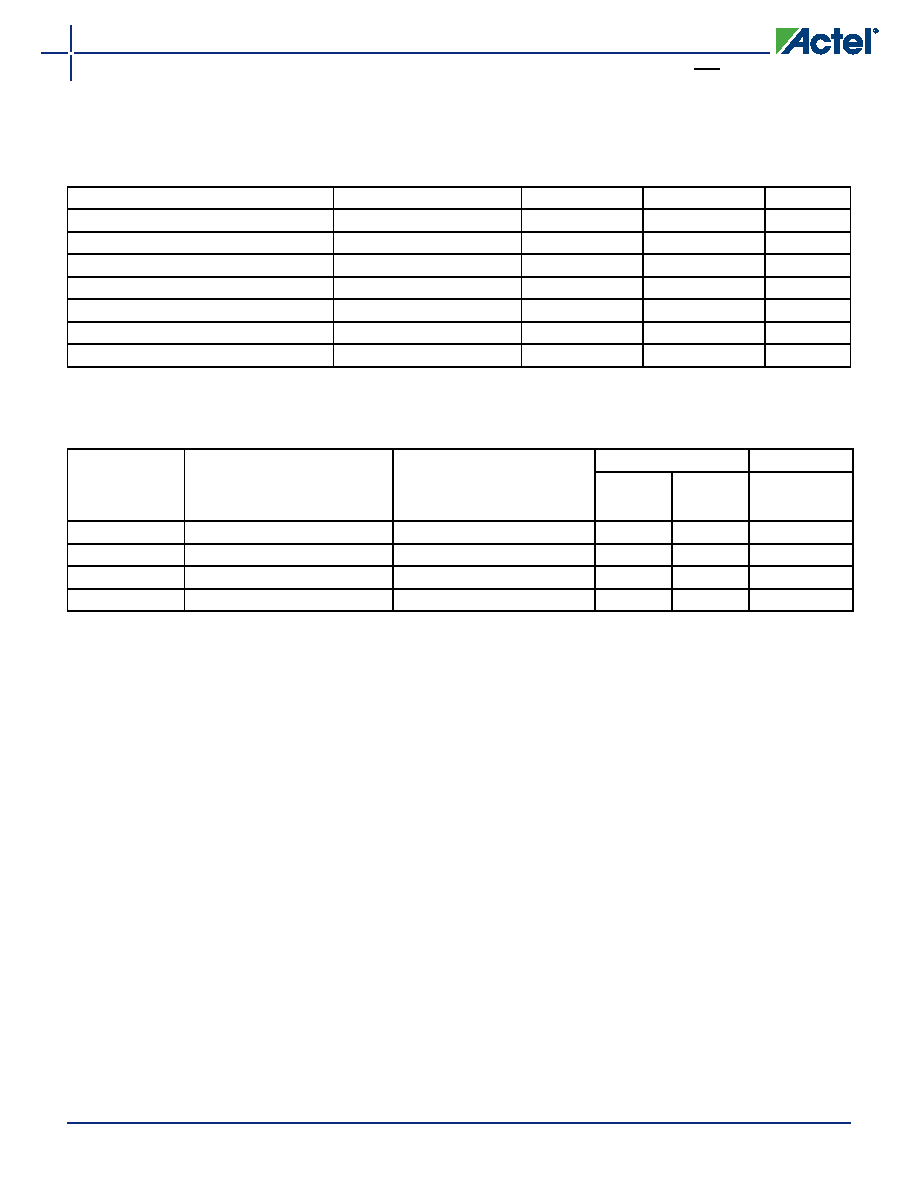- 您現(xiàn)在的位置:買(mǎi)賣(mài)IC網(wǎng) > PDF目錄4339 > APA1000-PQG208I (Microsemi SoC)IC FPGA PROASIC+ 1M 208-PQFP PDF資料下載
參數(shù)資料
| 型號(hào): | APA1000-PQG208I |
| 廠商: | Microsemi SoC |
| 文件頁(yè)數(shù): | 115/178頁(yè) |
| 文件大小: | 0K |
| 描述: | IC FPGA PROASIC+ 1M 208-PQFP |
| 標(biāo)準(zhǔn)包裝: | 24 |
| 系列: | ProASICPLUS |
| RAM 位總計(jì): | 202752 |
| 輸入/輸出數(shù): | 158 |
| 門(mén)數(shù): | 1000000 |
| 電源電壓: | 2.3 V ~ 2.7 V |
| 安裝類(lèi)型: | 表面貼裝 |
| 工作溫度: | -40°C ~ 85°C |
| 封裝/外殼: | 208-BFQFP |
| 供應(yīng)商設(shè)備封裝: | 208-PQFP(28x28) |
第1頁(yè)第2頁(yè)第3頁(yè)第4頁(yè)第5頁(yè)第6頁(yè)第7頁(yè)第8頁(yè)第9頁(yè)第10頁(yè)第11頁(yè)第12頁(yè)第13頁(yè)第14頁(yè)第15頁(yè)第16頁(yè)第17頁(yè)第18頁(yè)第19頁(yè)第20頁(yè)第21頁(yè)第22頁(yè)第23頁(yè)第24頁(yè)第25頁(yè)第26頁(yè)第27頁(yè)第28頁(yè)第29頁(yè)第30頁(yè)第31頁(yè)第32頁(yè)第33頁(yè)第34頁(yè)第35頁(yè)第36頁(yè)第37頁(yè)第38頁(yè)第39頁(yè)第40頁(yè)第41頁(yè)第42頁(yè)第43頁(yè)第44頁(yè)第45頁(yè)第46頁(yè)第47頁(yè)第48頁(yè)第49頁(yè)第50頁(yè)第51頁(yè)第52頁(yè)第53頁(yè)第54頁(yè)第55頁(yè)第56頁(yè)第57頁(yè)第58頁(yè)第59頁(yè)第60頁(yè)第61頁(yè)第62頁(yè)第63頁(yè)第64頁(yè)第65頁(yè)第66頁(yè)第67頁(yè)第68頁(yè)第69頁(yè)第70頁(yè)第71頁(yè)第72頁(yè)第73頁(yè)第74頁(yè)第75頁(yè)第76頁(yè)第77頁(yè)第78頁(yè)第79頁(yè)第80頁(yè)第81頁(yè)第82頁(yè)第83頁(yè)第84頁(yè)第85頁(yè)第86頁(yè)第87頁(yè)第88頁(yè)第89頁(yè)第90頁(yè)第91頁(yè)第92頁(yè)第93頁(yè)第94頁(yè)第95頁(yè)第96頁(yè)第97頁(yè)第98頁(yè)第99頁(yè)第100頁(yè)第101頁(yè)第102頁(yè)第103頁(yè)第104頁(yè)第105頁(yè)第106頁(yè)第107頁(yè)第108頁(yè)第109頁(yè)第110頁(yè)第111頁(yè)第112頁(yè)第113頁(yè)第114頁(yè)當(dāng)前第115頁(yè)第116頁(yè)第117頁(yè)第118頁(yè)第119頁(yè)第120頁(yè)第121頁(yè)第122頁(yè)第123頁(yè)第124頁(yè)第125頁(yè)第126頁(yè)第127頁(yè)第128頁(yè)第129頁(yè)第130頁(yè)第131頁(yè)第132頁(yè)第133頁(yè)第134頁(yè)第135頁(yè)第136頁(yè)第137頁(yè)第138頁(yè)第139頁(yè)第140頁(yè)第141頁(yè)第142頁(yè)第143頁(yè)第144頁(yè)第145頁(yè)第146頁(yè)第147頁(yè)第148頁(yè)第149頁(yè)第150頁(yè)第151頁(yè)第152頁(yè)第153頁(yè)第154頁(yè)第155頁(yè)第156頁(yè)第157頁(yè)第158頁(yè)第159頁(yè)第160頁(yè)第161頁(yè)第162頁(yè)第163頁(yè)第164頁(yè)第165頁(yè)第166頁(yè)第167頁(yè)第168頁(yè)第169頁(yè)第170頁(yè)第171頁(yè)第172頁(yè)第173頁(yè)第174頁(yè)第175頁(yè)第176頁(yè)第177頁(yè)第178頁(yè)

ProASICPLUS Flash Family FPGAs
v5.9
2-31
Operating Conditions
Table 2-17 and Table 2-18 delineate operating limits.
Performance Retention
For devices operated and stored at 110°C or less, the
performance
retention
period
is
20
years
after
programming. For devices operated and stored at
temperatures greater than 110°C, refer to Table 2-19 on
page 2-32 to determine the performance retention
period. Actel does not guarantee performance if the
performance retention period is exceeded. Designers can
determine the performance retention period from the
following table.
Evaluate the percentage of time spent at the highest
temperature,
then
determine
the
next
highest
temperature to which the device will be exposed. In
Table 2-19 on page 2-32, find the temperature profile
that most closely matches the application.
Example – the ambient temperature of a system cycles
between 100°C (25% of the time) and 50°C (75% of the
time). No forced ventilation cooling system is in use. An
APA600-PQ208M
FPGA
operates
in
the
system,
dissipating
1 W.
The
package
thermal
resistance
(junction-to-ambient) in still air Θja is 20°C/W, indicating
that the junction temperature of the FPGA will be 120°C
(25% of the time) and 70°C (75% of the time). The entry
in Table 2-19 on page 2-32, which most closely matches
the application, is 25% at 125°C with 75% at 110°C.
Performance retention in this example is at least 16.0
years.
Note that exceeding the stated retention period may
result in a performance degradation in the FPGA below
the worst-case performance indicated in the Actel Timer.
To ensure that performance does not degrade below the
worst-case values in the Actel Timer, the FPGA must be
reprogrammed
within
the
performance
retention
period. In addition, note that performance retention is
independent of whether or not the FPGA is operating.
The retention period of a device in storage at a given
temperature will be the same as the retention period of
a device operating at that junction temperature.
Table 2-17 Absolute Maximum Ratings*
Parameter
Condition
Minimum
Maximum
Units
Supply Voltage Core (VDD)–0.3
3.0
V
Supply Voltage I/O Ring (VDDP)–0.3
4.0
V
DC Input Voltage
–0.3
VDDP + 0.3
V
PCI DC Input Voltage
–1.0
VDDP + 1.0
V
PCI DC Input Clamp Current (absolute)
VIN < –1 or VIN = VDDP + 1 V
10
mA
LVPECL Input Voltage
–0.3
VDDP + 0.5
V
GND
00
V
Note: *Stresses beyond those listed under "Absolute Maximum Ratings" may cause permanent damage to the device. Exposure to
absolute maximum rated conditions for extended periods may affect device reliability. Devices should not be operated outside the
Recommended Operating Conditions.
Table 2-18 Programming, Storage, and Operating Limits
Product Grade
Programming Cycles (min.)
Program Retention (min.)
Storage Temperature
Operating
Min.
Max.
TJ Max.
Junction
Temperature
Commercial
500
20 years
–55°C
110°C
Industrial
500
20 years
–55°C
110°C
Military
100
Refer to Table 2-19 on page 2-32
–65°C
150°C
MIL-STD-883
100
Refer to Table 2-19 on page 2-32
–65°C
150°C
相關(guān)PDF資料 |
PDF描述 |
|---|---|
| 24LC024-I/SN | IC EEPROM 2KBIT 400KHZ 8SOIC |
| APA1000-PQ208I | IC FPGA PROASIC+ 1M 208-PQFP |
| 24C02CT/SN | IC EEPROM 2KBIT 400KHZ 8SOIC |
| EP2AGX190FF35C6N | IC ARRIA II GX 190K 1152FBGA |
| 24C02CT-I/SN | IC EEPROM 2KBIT 400KHZ 8SOIC |
相關(guān)代理商/技術(shù)參數(shù) |
參數(shù)描述 |
|---|---|
| APA1000-PQG208M | 制造商:Microsemi Corporation 功能描述:FPGA ProASICPLUS Family 1M Gates 180MHz 0.22um Technology 2.5V 208-Pin PQFP 制造商:Microsemi Corporation 功能描述:FPGA PROASICPLUS 1M GATES 180MHZ 0.22UM 2.5V 208PQFP - Trays 制造商:Microsemi Corporation 功能描述:IC FPGA PROASIC+ 1M 208PQFP |
| APA1000-PQGB | 制造商:ACTEL 制造商全稱(chēng):Actel Corporation 功能描述:ProASIC Flash Family FPGAs |
| APA1000-PQGES | 制造商:ACTEL 制造商全稱(chēng):Actel Corporation 功能描述:ProASIC Flash Family FPGAs |
| APA1000-PQGI | 制造商:ACTEL 制造商全稱(chēng):Actel Corporation 功能描述:ProASIC Flash Family FPGAs |
| APA1000-PQGM | 制造商:ACTEL 制造商全稱(chēng):Actel Corporation 功能描述:ProASIC Flash Family FPGAs |
發(fā)布緊急采購(gòu),3分鐘左右您將得到回復(fù)。